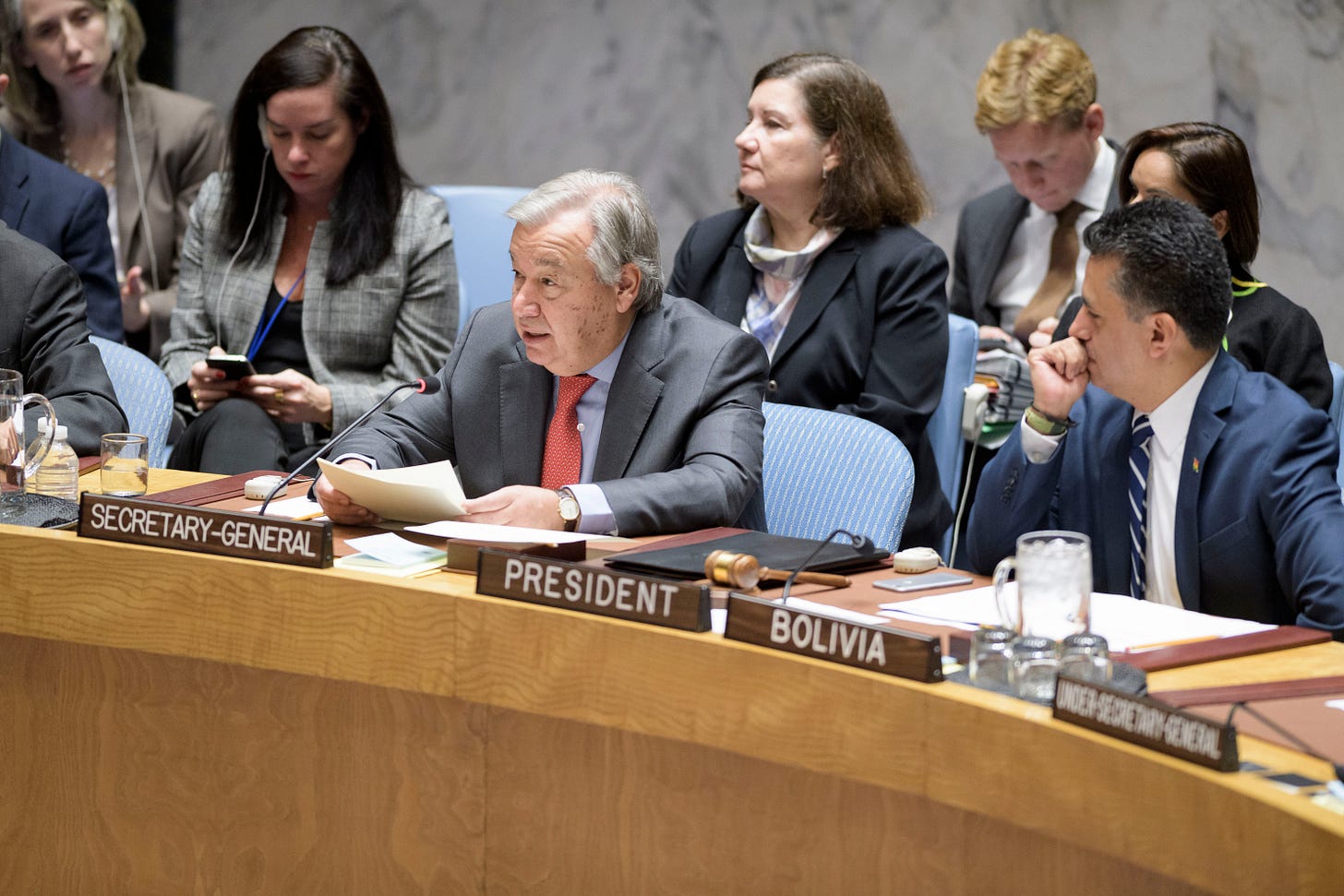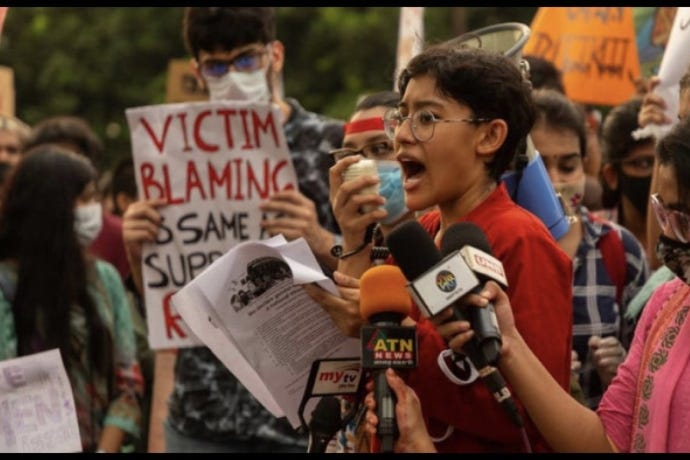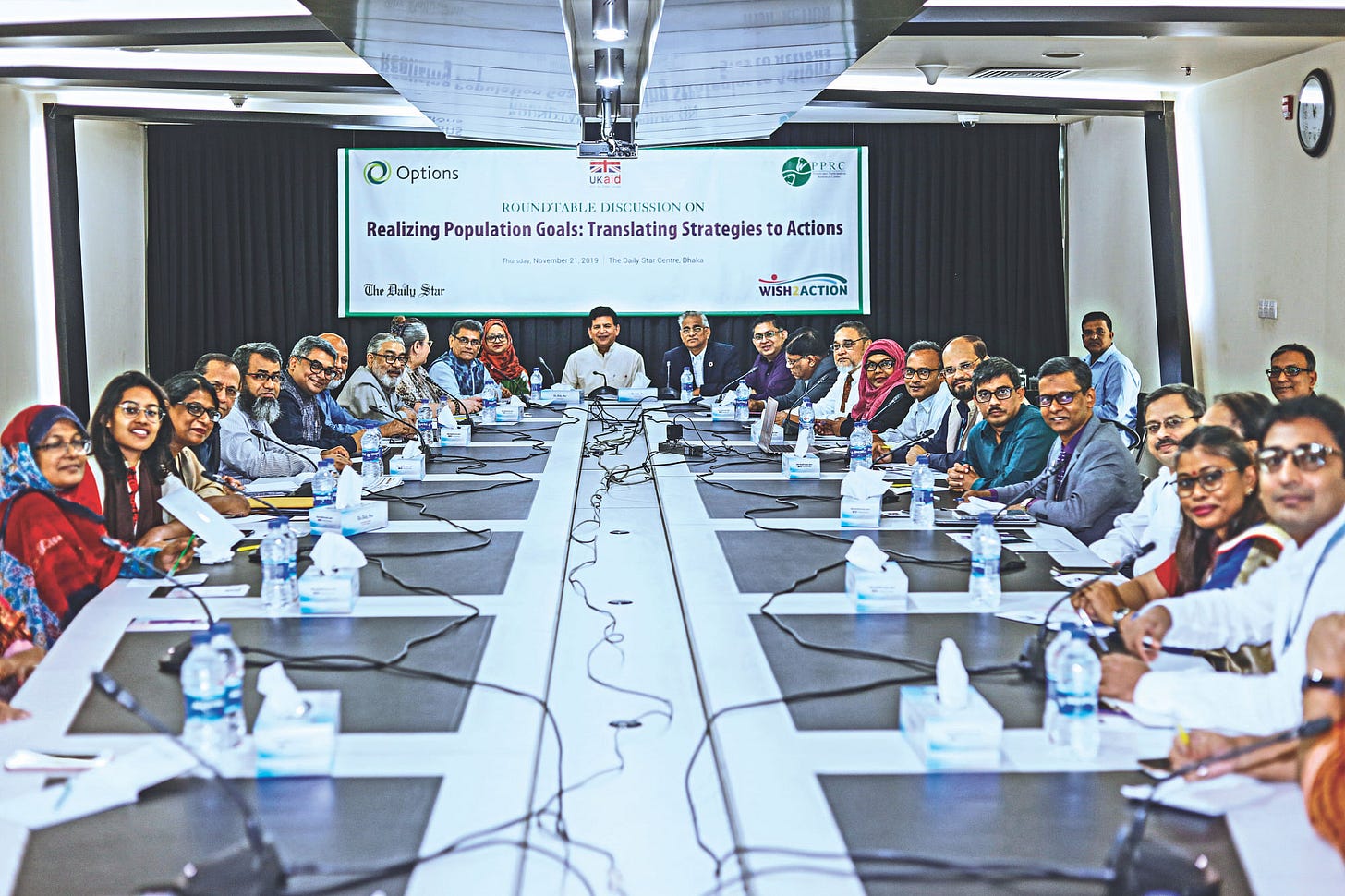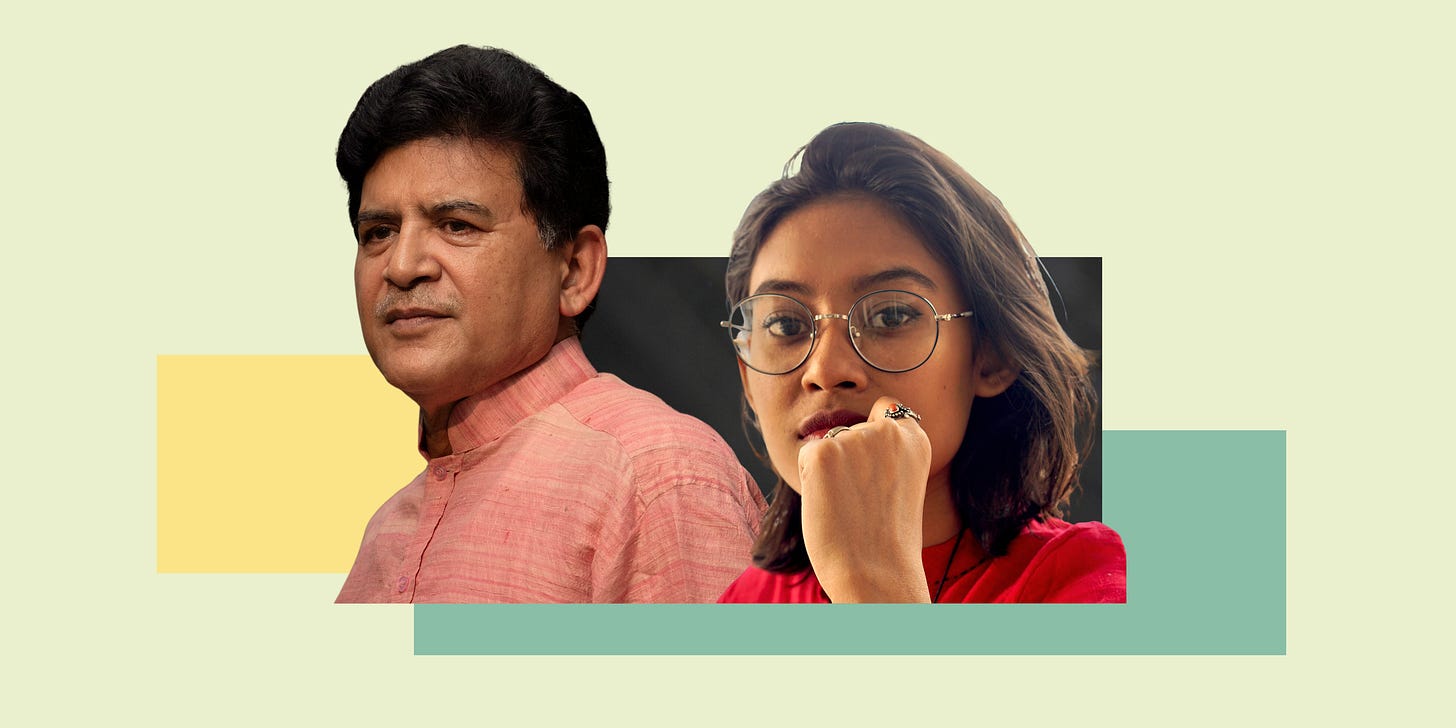Grassroots to Institutions: How Civil Society Shapes Public Policy
Dr. Hossain Zillur Rahman and Umama Zillur discuss the instrumental role of non-state actors in anchoring Bangladesh's developmental trajectory.
For the inaugural publication of ImpactInk, Aftab Ahmed, BacharLorai's Director of Policy Research, interviewed the trailblazing father-daughter duo: Dr. Hossain Zillur Rahman and Umama Zillur. Dr. Rahman is the Chairperson at BRAC, the founder and Executive Chairman of the Power and Participation Research Centre, and a former Advisor to the Caretaker Government of Bangladesh. His daughter, Umama Zillur, is the Founder and Director of Kotha. In their conversation, they trace the historical contributions, identify contemporary challenges, and envision the future roles of non-state actors in advancing Bangladesh’s policy objectives.
Aftab Ahmed: Dr. Rahman and Umama, please accept my gratitude for agreeing to participate in today’s conversation. Without any delay, let’s get the ball rolling.
Drawing from your experiences in Bangladesh’s public policy space, what role have the civil society and NGO sectors played in the country’s journey?
Hossain Zillur Rahman: In terms of the specific nature of Bangladesh’s development journey, it has been marked by a pluralistic character. Meaning the transformation of Bangladesh in every sense — both via economic and social lenses — has arisen from the contribution of a variety of actors, both state and non-state.
Before I talk about their contributions, I think it is important to have a typology of non-state actors. Within the private sector, we have actors ranging from large associations such as the Federation of Bangladesh Chambers of Commerce and Industry (FBCCI), to small and medium-sized enterprises (SMEs). Additionally, there are the non-governmental and civil society sectors. One way to differentiate between these categories is to draw from Western schools of thought, distinguishing between organizations that focus on service delivery, like microcredit, and those that engage in rights-based advocacy.
In a way, this distinction is also artificial. For example, when you talk about microcredit, it is very much akin to an economic program, but with tremendous social impact. Microcredit was centered around rural, disadvantaged women who were never involved in organized economic activities. That in itself was a big social change. The categorization of the non-governmental sector, when viewed through the lens of Western development discourse, often fails to capture the richness and reality of civil society and non-governmental presence in the Bangladeshi context.
Returning to the subject of key contributions, one of the foremost is that of financial inclusion. In fact, Bangladesh’s civil society brought the financial inclusion agenda front-and-center to the national policy discourse. They also considered how to integrate participatory processes into the developmental agenda, ensuring it reaches the grassroots level. Two signature areas where they took the lead, before the government assumed a more prominent role, are the health and education sectors.
In the health sector, the focus was on child immunization. While the government offered child immunization as a free program, it struggled to acquire traction from the public. However, when partnerships were established with the NGO sector, particularly with BRAC, the initiative accelerated rapidly. Civil society demonstrated how best to effectively engage communities in this effort.
Civil society also contributed heavily through education advocacy. While the state played an impressive role in the supply-side of education delivery, demand-side blind-spots were tackled by non-state actors. Issues like adult education, filling in access gaps for those left behind, and the provision of informal education services are arenas where civil society has made tangible impact. Again, the interplay of the state and the non-state was dynamic.
Umama Zillur: I think it is important to flag Bangladesh as a rare case study in this scenario. This partnership between civil society and the state is unique to Bangladesh. For many reasons, the state has historically facilitated the space for non-state actors to take on a central role across core sectors such as health and education. BRAC is one of the largest non-state actors in our country. If we look at BRAC’s operations in other countries, regulatory restrictions placed on non-state actors by host governments are a big reason why its impact is not as profound elsewhere.
Hossain Zillur Rahman: I must also reiterate that civil society has historically played an impressive role in bringing about novel policy agendas to the forefront. Renewable energy is another one of those areas. Specifically, a good example would be the discourse surrounding solar power. The impetus originated from the NGO sector and the first wave of expansion was attributed to their grassroots-oriented organizational models of working directly with people on-the-ground.

While I understand and agree with both of your views on the positive impact of civil society, how would you address the criticism that Western entities might use these groups to simply prescribe their own policy solutions?
Hossain Zillur Rahman: When examining financial inclusion, the driving force was not influenced by Western models. Instead, it was a purely homegrown innovation. Similarly, the innovations in non-formal education and primary healthcare models were the creations of domestic actors.
The issue of Western influence can be seen through the lens of developmental finance. Funding for the NGO sector came from foreign governments as well as INGOs — women’s rights organizations, community development organizations etc. I will add that the Western influence was not limited to civil society but also in government. For example, funding for large-scale infrastructure projects represented institutional vehicles for the West’s influence. The choice of commercial forestry policies, for example, was directly influenced by entities such as the World Bank and the Asian Development Bank.
Umama Zillur: It is important to highlight the agency of local actors within this broader ecosystem of the civil society or NGO space. There is an oversimplification of the Western influence through the nonprofit sector — it is not a one-way linear play of power when it comes to setting development agendas and goals.
It is important to view local actors not as passive consumers of Western agendas. The reality is that local actors are exercising their agency, “gaming the system” when possible, and deciding how to navigate the existing funding space while holding onto their priorities. This is especially true for organizations that were not birthed through NGO projects as such — but via their own independent missions.
Hossain Zillur Rahman: One channel of Western influence manifests in agenda-setting. Decentralization and governance are two areas that have attracted considerable international funding and projects. While the Western influence in these sectors has been substantial, the impact, unfortunately, has not been as pronounced. We have yet to see any significant progress on the ground.
Another concern is the consistency and durability of engagement and outcomes. You begin a project with a single operator. One would assume that it is your responsibility to see the project through from start to finish. However, you then shift focus to something else and do not build upon the original project, correct? The inconsistency in focus or approach by Western-led initiatives remains a barrier to the notion of impact and sustainability.
Umama Zillur: Right, your point is basically about funding strategies and structure that either enables or rather hinders progress. I completely agree with you on this point. Through Kotha, we have seen firsthand how the project-centric approach of development funding can impede actual work. Such an approach is not conducive to institutional development and does not allow you to focus on sustainable long-term transformation. The dominant funding structures are predominantly oriented towards short-term service delivery, and even then, there is little consistency in how long programs can operate.

Dr. Rahman, as an economist, can you shed light on whether there has been a concerted effort to conduct research and evaluation to measure the impact of the non-profit and social impact sectors on Bangladesh's economic development? If such research exists, could you provide insights? If not, what might be the reasons behind this?
Hossain Zillur Rahman: There is quite a bit of research available on the progress along Millennium Development Goal (MDG) indicators — this includes inclusive growth, quality of life, housing transformation or rural housing, access to solar power via home lighting, WASH, access to sanitation etc. But for the most part, the research has been limited to economic development. The NGO sector has played a particular role in expanding the informal services sector, leading to the growth of the domestic economy and, consequently, Bangladesh's economic development. This phenomenon has been documented in research.
What has been overlooked is the influence of the non-government sector or civil society on social indicators beyond the MDG indicators previously mentioned. Research on the effects of change, shifts in power structures and public attitudes, and the connection between determinants and outcomes remain missing pieces. Even where there is existing research, the research is unable to connect the dots — we can see the impact but not the causality of the contribution of the civil society or NGO sectors. And the research produced by the NGO sector has been less robust.
And again, going back to the previous point of the projectized model, much of their energy is spent on research that is limited to their narrow project evaluation goals but not from a broader lens. For example, there was a massive program funded by the British called the “Chars (Riverine Islands) Livelihoods Program”. Did it have an impact? To me, it is unclear if it did, especially beyond the immediate project goals.
Umama Zillur: So, whose responsibility should this be? Smaller NGOs, as well as larger ones involved in service delivery or advocacy, often lack the research acumen, expertise, resources, or time to conduct comprehensive research or assessments from a broader perspective. Should the goal be to make sure that these NGOs themselves are equipped or should there be another type of actor involved?
Hossain Zillur Rahman: I think the primary issue is the financing of such independent research. Neither the development partners, the government, nor the NGOs themselves have been particularly forthcoming in providing the necessary independent funding for such studies. This lack of available independent funding has been a significant weakness. One area where civil society has played an impressive role is on the theme of urbanization. Urbanization was not a big research agenda 20 years ago, but PPRC has played a role in bringing forth this issue as an important research agenda.

Umama, having founded a feminist organization, activism is central to your work. In the context of Bangladesh in 2023, what key message would you convey about how activism can influence policy, especially within the non-profit and social impact sectors?
Umama Zillur: Look, activists have played a central role in shaping Bangladeshi society since 1971. In both formal settings — such as formulating policies, designing interventions and programs, and proposing legal reforms — and in influencing public opinion, they have helped shift narratives and introduced new discourse, creating a public demand for social and economic change. For example, national initiatives such as our One-stop Crisis Centers (OCCs), were a direct result of the work done by feminist activists.
The activism “sector” has the opportunity to build a more robust infrastructure. What I mean by this is that we need to develop well-organized and well-connected networks of actors with expertise spanning different professions — from journalists, lawyers, artists, researchers, policymakers, writers, to doctors and beyond. We need to develop processes for bringing in younger actors into this space and prioritize long-term strategic thinking.
Part of this infrastructure should encompass dedicated resources, individuals, and time for enhanced archiving and documentation of both the efforts undertaken by these participants and the subsequent outcomes of their work. I believe this is how the activism space can remain equipped to tackle emerging challenges such as climate change and injustice within the digital space. The most important role activists can and should play, as actors who are closest to the ground, is defining priority areas for the non-profit and social impact sectors.

Final question to the both of you. Some argue that there is insufficient oversight of civil society operations in Bangladesh. As members of civil society, could you each identify the top areas that need improvement to enhance transparency, impact, and accountability within Bangladesh's non-profit and social impact sectors?
Umama Zillur: I do not think insufficient oversight is the key issue for us. Individuals in the non-profit or NGO sectors, particularly the smaller entities, often express their concerns regarding the bureaucratic hurdles posed by the NGO Bureau. They highlight the stringent oversight the Bureau exercises, both in terms of acquiring international or national funding and the exhaustive documentation required to demonstrate how the funds are utilized. I believe the real challenge regarding transparency in this sector lies in defining what "impact" means to begin with.
Organizations are able to use metrics like the number of beneficiaries reached without having to provide evidence of actual long-term benefits for individuals and communities they serve. We stop asking the hard questions — both the people who are receiving the funds and the people who are providing the funds. So, there can be improvement there. There needs to be a move beyond numbers to a holistic definition of impact.
Another concern is the allocation of funds between larger INGOs or more prominent local NGOs and the smaller entities. The structures and processes used to channel funding to those working directly on the ground also pose challenges. The question arises: who garners the majority of the funding versus who carries out the lion's share of the actual work? Globally, based on research by the OECD, from 2017 to 2018, women’s rights organizations for example, received a mere 0.13 percent of the total Official Development Assistance (ODA) or foreign aid. This represents only 0.4 percent of all aid focused on gender issues. On a national level, it is important to examine how much of the allocated funding is directed towards those leading the charge in gender justice efforts, particularly feminist or women-led organizations.
Hossain Zillur Rahman: Umama, I think you are absolutely right that oversight is not the issue. In fact, now we are seeing the opposite: oversight is morphing into intrusion, control, and intimidation. The primary emphasis should be on establishing a shared understanding of what impact means and determining the outcomes we should aim for. And I think this goes back to the issue of insufficient resources for independent research. Researchers also must demonstrate the value addition of their work — ranging from how their research informs policymaking and how it improves the implementation capacity of interventions.
In Bangladesh's NGO space, there was once a cherished tradition known as “action research”. During the early stages of our development journey, it held a position of immense importance. However, over time, it has lost its prominence, and this decline is a failure. Especially concerning the social development agenda, the question of what truly defines progress beyond mere economic growth has become crucial. The absence of clear indicators to assess this aspect represents a knowledge gap that we need to address.
Dr. Hossain Zillur Rahman is a distinguished economist and policy advocate from Bangladesh. Educated at Dhaka University and Manchester University, he established the Dhaka based think tank Power and Participation Research Centre (PPRC) in 1996 where he currently serves as the Executive Director. In 2019, Dr. Rahman took on the additional role of Chairperson of BRAC, Bangladesh. Dr. Rahman spearheaded the pivotal 62-village Analysis of Poverty Trends Project and was central in formulating Bangladesh’s poverty reduction strategy in 2004. He has held positions with the Independent South Asian Commission on Poverty Alleviation and the board of Bangladesh's central bank. With an extensive portfolio of research publications, Dr. Rahman's work has shaped policy discussions on diverse topics from urbanization to social protection. Serving as Advisor (Cabinet Minister) for the ministries of Education and Commerce (2007-08), he was instrumental in guiding Bangladesh's transition back to electoral democracy. His contributions have been recognized with awards such as the Dr. John Meyer Global Citizenship Award in 2009 by Tufts University and Rotary International Bangladesh's Gold Medal Award in 2013.
Umama Zillur is the founder of Kotha, a Bangladesh-based feminist organization. As a passionate researcher and community organizer, she has steered Kotha in leveraging community engagement, educational outreach, arts, theater, and research to address the root causes of gender-based violence. Her groundbreaking initiative, "Kotha at School," stands as one of Bangladesh's first youth-centric comprehensive sexuality education programs. With its aim to reshape societal perspectives and behaviors, the program has reached over 1,000 students, fostering crucial educational partnerships and championing solutions to counteract the nation's rape culture. In addition to her work with Kotha, Umama has been pivotal in national coalition-building efforts, synergizing mass protests with policy advocacy for tangible social change during the Rage Against Rape Movement in 2020. Her research endeavors span Bangladesh's low-income areas and even the Rohingya refugee camps, offering insights into power structures and violence from a gendered perspective. A graduate of the University of Chicago’s Harris School of Public Policy, Umama also served as a Fellow at the Pearson Institute for the Study and Resolution of Global Conflict.
Impact Opportunities
Job Drop: The World Bank Group Young Professionals Program is a prestigious gateway for global talents with a strong commitment to international development, aiming to nurture future leaders for the World Bank Group.
Scholar’s Hop: The WaterAid Young Media Fellowship on WASH by WaterAid will provide select journalists with the resources and platform to effectively report on and influence the discourse surrounding WASH issues in Bangladesh.
Writer’s Shop: Editing your own writing is a challenging step, as highlighted in this New York Times article which provides practical strategies for improving and perfecting your work prior to sharing it with an audience.
About ImpactInk
ImpactInk, a dedicated platform under BacharLorai, curates and publishes essential discussions and insights from the non-profit, philanthropy, and social impact sectors. Designed to address the need for a cohesive discourse platform in these areas, ImpactInk aspires to serve as the go-to hub for policy insights and collaborative idea exchange.
For pitches or to learn more about ImpactInk, please reach out to the Editor-In-Chief and Director of Policy Research at aftab.ahmed@bacharlorai.com





